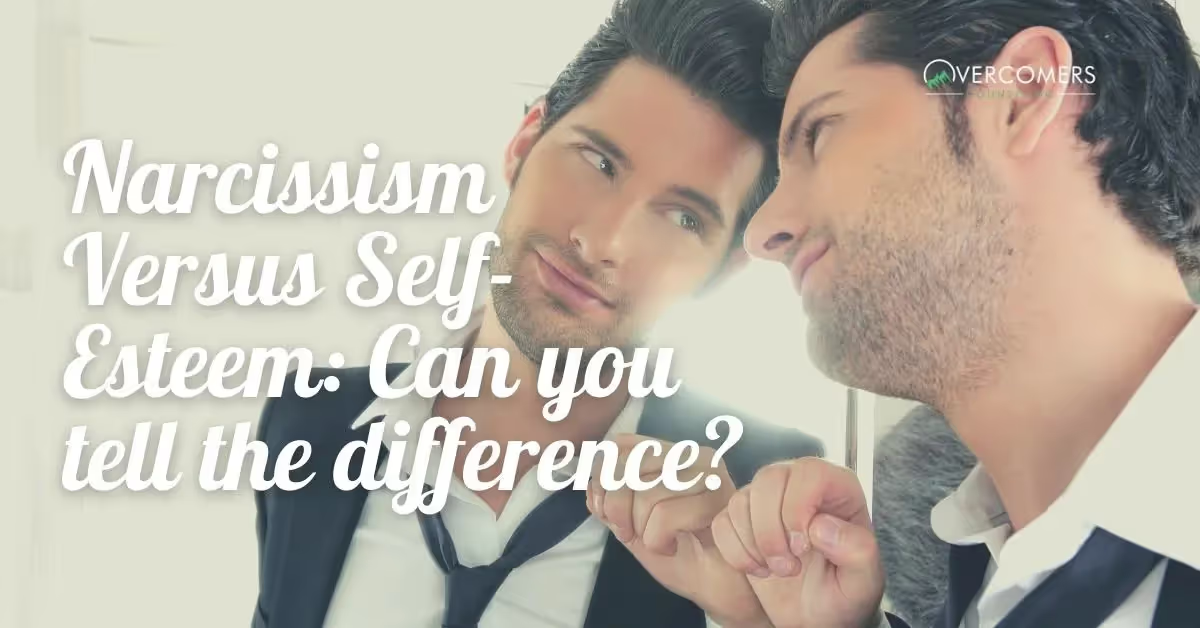Is the fear of looking like a narcissist standing in the way of one having high self-esteem? Many people have heard the saying, "Oh that person is full of...

Is the fear of looking like a narcissist standing in the way of one having high self-esteem? Many people have heard the saying, "Oh that person is full of themselves" and many have mixed feelings and opinions regarding that statement. Some people have developed somewhat of an unspoken fear to not be correlated with having high self-esteem so they would not be mistaken as being a narcissist or "full of themselves". Can one who has high self-esteem be a narcissist? Or does a narcissist really have high self-esteem? Learning how to differentiate the two might help one to put some pep in their step and feel alright allowing their self-esteem to shine through. Let us take a look at the differences between high self-esteem and narcissism.
In order to look at the differences, one must understand the meaning of each subject narcissism and self-esteem. Narcissism can derive from a few different avenues…
Heredities: family traits (In the DNA)
Upbringing: extreme idolization or extreme condemnation caregiver-child relationships which are oblivious to the child's understanding (Parents abuse the child, expect the child to always be perfect, or the other extreme is to overly love on the child and always praise them regardless of their accomplishments or lack thereof, they see their child as perfect and could do no wrong)
Neurobiology: the connections between the brain and behavior and thinking
Narcissism is defined by the google search definitions as…
selfishness, involving a sense of entitlement, a lack of empathy, and a need for admiration, as characterizing a personality type.
Self-centeredness arising from failure to distinguish the self from external objects, either in very young babies or as a feature of mental disorder.
Narcissism has nine conditions in The Diagnostic and Statistical Manual of Mental Disorders, fifth edition (DSM-V)…

Self-esteem, confidence, pride in oneself is a form of motivation and a way one sees themselves. Self-esteem is derived from the experiences one has and the nurturing/responses or lack thereof of the experiences from trusted people in a person's life as one grows. The nurturing one really needs are being treated with respect and for one to be heard. Anyone can listen, yet not everyone hears, and this is where the "pay attention" phrase comes from. One feels valued when they are heard/respected. It means someone took the time to put aside what they are doing and not just listen to the words one is saying but hear what one is saying and respond back in a nonjudgmental way. The individual was given empathy and encouragement to try again when they failed at something and not scolded.
Self-esteem is defined as one's own perception of their biased judgment of their value to themselves and others. There is also explicit self-esteem and implicit self-esteem. Explicit self-esteem is determined by what we say about ourselves such as "I am unwanted," "I am ugly,", "I am a disappointment, "and "I am good-looking". Implicit self-esteem is determined by one's unconscious reactions or implications one makes about themselves based off of other people's statements made such as "You are silly" and the individual then acts silly or like a "class clown" or one thinks, "yes I like to tell jokes when I am happy," or "You are smart" then the person thinks they have to be perfect or have all the answers to everything, or "I can be resourceful and find the answers to things I do not know about. I can be creative or figure out answers to things many times". There are two levels of self-esteem: high self-esteem and low self-esteem.
People with low self-esteem did not have the support they needed to develop proper implicit and explicit self-esteem because the people they trusted did not offer or give the support required to know how to have positive explicit and implicit self-esteem/talk. A person with low self-esteem more than likely had trusted people make them need to be perfect (failure is bad or not allowed), analyzed them ruthlessly, and possibly abused them. The lack of opportunity to have an environment to experience or learn empathy or failure was not present. The individual did not learn it is alright to ask for help, make mistakes, set boundaries, accept feedback, and trust their own opinions, thoughts, and values.
Someone with high self-esteem had the experiences of having nurturing/supportive people in their lives who treated them with respect and heard them or paid attention to them when they spoke, hurt, failed, or were scared. These people provided the guidance on how to not be afraid to try again, to talk nice to oneself, to not criticize oneself, or try to be perfect, yet to roll with life and everyone makes mistakes because after all… we are all just humans on a journey call life.
Someone with high self-esteem holds these characteristics…

Narcissists face many complications in life they do not always recognize because their egos tend to be inflated with their perception of themselves. Narcissist's complications are…
Seeking Help
When is it a good time to seek help? Should I seek help if I have low self-esteem or might be a narcissist?
The answer is, yes. If your life functioning is being disrupted and you are noticing that you do not have a life that is satisfying in the sense that you are feeling continuous patterns such as…
Or any other issues that keep one from being able to live one's life mentally healthy should seek counseling. Talk therapy is just one form of mental health therapy that can benefit a person to gain the tools to feel better about themselves and learn/gain high self-esteem.
So now that one knows the difference between narcissism and high self-esteem, one could go ahead and practice feeling good about themselves. A little self-pride, self-esteem, or self-love in feeling oneself as a valued unique human being can go a long way in how one responds to one experiences along their journey in life. A moment of failure does not set the person back, or an unkind word does not set them recoiled in a fetal position on their couch for a week, or a breakup from a long-term partnership does not send one emotional eating for a month; nor does it mean one will never be able to succeed in life when the long bumpy road seems endless.
It means one with high self-esteem says, this is not fun during the times of hardship; yet seeks people for support, sinks their feet in, gets creative, still practices self-care still sets healthy boundaries, still speaks assertively, and says, no matter how long the trial is; and says this trail is not forever. Having high self-esteem is knowing life is full of richness and joy even during the times of struggle and pain; it is sharing a tender vulnerable moment with someone when you feel your life is too crazy at that moment as well; it is saying, success is not in monetary things such as homes, cars, investments, retirement funds, and so on (those are good to have); they are in the quality and vibrancy of the friendships, family, and work relationship created. High self-esteem is experiencing the tough times yet remaining positive and not giving up. It is your time to decide… narcissism, low self-esteem, or high self-esteem. Call a counselor today and see what tomorrow brings.
There are many different kinds of narcissists, but the six main types are The Narcissistic Victim, The Covert Narcissist, The Malignant Narcissist, The Exhibitionist Narcissist, The Somatic or Cerebral Narcissist, and The Toxic Parent.
While it's possible for a narcissist to feel remorse, it's not typically associated with their behavior. Due to their inflated sense of self and lack of empathy, narcissists may not feel guilty after cheating. Instead, they might use manipulation tactics, or other forms of narcissistic abuse, to justify their actions or shift the blame onto others.
When a narcissist ignores you, it's common to feel guilty. However, remember that this is a common tactic used by narcissists to make you question your worth. Try not to internalize this guilt. Instead, create boundaries and seek support from trusted friends, family, or a mental health professional.
According to research, narcissistic personality disorder (NPD) is found in approximately 4.8% of females.
Narcissistic traits that may lead to cheating include an exaggerated sense of self-importance, a lack of empathy for others, a need for constant admiration, and poor impulse control. These individuals may feel entitled to pursue other relationships without considering the feelings of their current partner.
While both male and female narcissists exhibit similar traits like a sense of entitlement, lack of empathy and need for admiration, there can be differences. Female narcissists, for instance, might use their relationships with other women to bolster their self-esteem or manipulate for personal gain. Male narcissists, on the other hand, may be more prone to showcase their narcissism through their professional achievements or financial success.